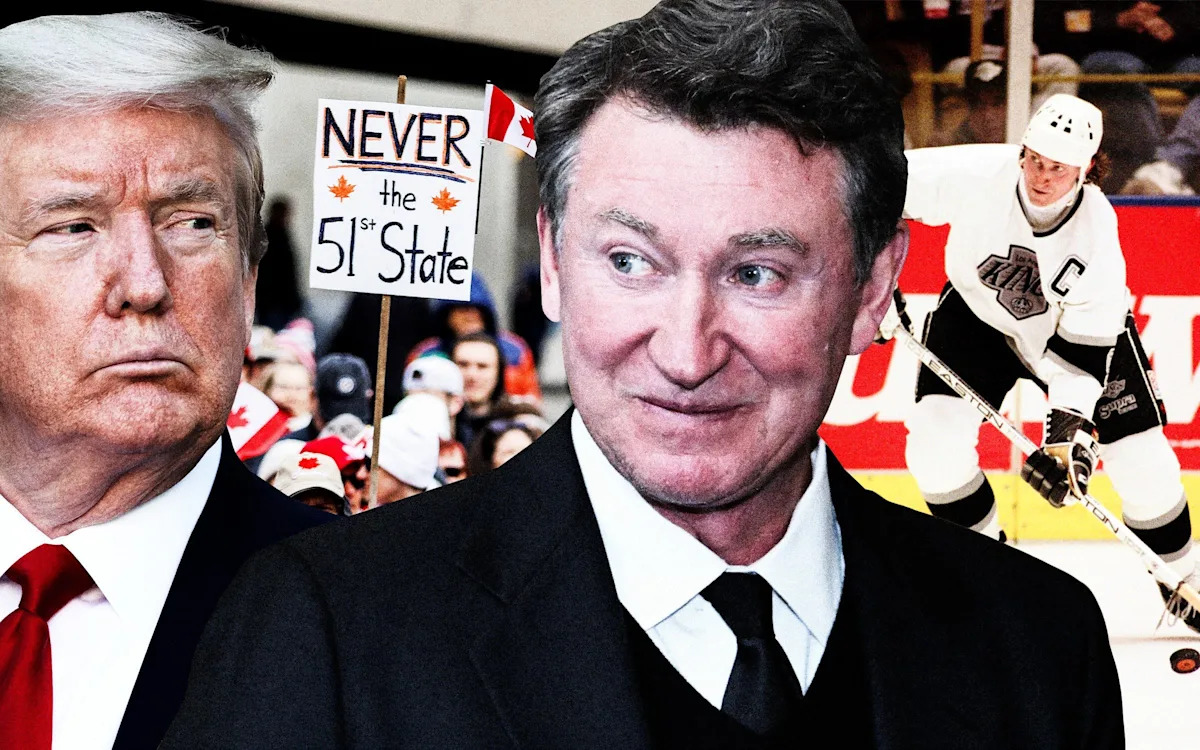Wayne Gretzky, formerly revered as Edmonton’s adopted son and the greatest ice hockey player, now faces a tarnished reputation in Canada. His alignment with Donald Trump, a figure widely unpopular among Canadians, has sparked outrage and led to public disapproval. This article delves into Gretzky’s journey from national icon to controversial figure, examining the impact of his political associations on his legacy.
Gretzky’s career with the Edmonton Oilers transformed the city into the epicenter of the hockey world, securing four Stanley Cups in the 1980s. Today, a statue outside Rogers Place commemorates his achievements. However, recent acts of vandalism against the statue reflect the public’s shifting sentiment. This article explores why ‘The Great One’ has become a pariah in the eyes of many Canadians.
From Edmonton Icon to Los Angeles King
In 1988, Gretzky’s trade to the Los Angeles Kings marked the end of an era. His departure symbolized a shift in hockey, moving from a smaller Canadian market to a major American city. The trade was driven by financial constraints, as Oilers’ owner Peter Pocklington could no longer afford Gretzky’s salary.
The sale ignited public anger in Canada. Pocklington was vilified, and his businesses faced boycotts. This move highlighted the growing influence of money in sports and the emotional attachment fans had to Gretzky as a national symbol. The trade ushered in the era of big-money hockey, forever changing the landscape of the sport.
Olympic Pride and National Allegiance
Gretzky’s patriotism was on full display during the 2002 Salt Lake City Winter Olympics. Tasked with leading the men’s ice hockey team, he aimed to secure Canada’s first gold medal in 50 years. His response to American press skepticism, declaring, ‘Everybody loves to see us lose,’ galvanized the team and the nation.
Canada defeated the United States in the final, cementing Gretzky’s status as a national hero. This victory underscored his commitment to his country and his ability to inspire national pride. However, this image of patriotic fervor would later be challenged by his association with Donald Trump.
The Trump Association and Public Backlash
The turning point came with Gretzky’s visible support for Donald Trump. Attending a Mar-a-Lago party on election night and Trump’s inauguration, Gretzky’s actions signaled a political alignment that clashed with Canadian values. A photograph of him wearing a ‘Make America Great Again’ hat further fueled the controversy.
His son-in-law, Dustin Johnson, a long-time friend of Trump, deepened the connection. This association sparked outrage among Canadians, who viewed Trump’s rhetoric and policies as detrimental to their nation. Gretzky’s silence on Trump’s anti-Canadian statements exacerbated the situation.
Conservative Ties and Political Affiliations
Gretzky’s past includes associations with Canadian conservative politicians such as Stephen Harper and Patrick Brown. His friendship with an American conservative might not have raised eyebrows, but his silence amid Trump’s anti-Canadian rhetoric became a focal point of criticism.
Trump’s comments, including suggesting Canada should become the 51st state and referring to Justin Trudeau as the ‘governor’ of Canada, were seen as insults to Canadian sovereignty. Gretzky’s failure to publicly denounce these statements intensified the backlash.
Canadian Outrage and National Pride
Trump’s remarks ignited a sense of national pride among Canadians. The public rallied around the flag, booing the US anthem at sports games and denouncing Trump’s claims about life being better as part of the United States. New Prime Minister Mark Carney reaffirmed Canada’s alliance with the US, highlighting mutual support and shared values.
Despite the widespread disapproval of Trump, Gretzky remained silent. Calls for him to comment were ignored, leading to increased criticism. Even supporters like Bobby Orr urged Canadians to forgive Gretzky, but their pleas went largely unheeded.
Public Appearances and Symbolic Gestures
Gretzky’s appearance at a Canada versus USA hockey game in Boston further fueled the controversy. Dressed in a navy suit rather than the traditional red Canadian jersey, his choice was seen as a lack of national pride. This contrasted sharply with other Canadian celebrities who openly criticized Trump’s rhetoric.
The fact that Gretzky has not yet attended his investiture ceremony for the Order of Canada has also been noted. These actions, combined with his silence, have led many to question his commitment to his homeland.
Other Voices of Dissent
Other Canadian celebrities have spoken out against Trump’s rhetoric. Comedian Mike Myers urged Canadians to defend their space, while Michael Bublé declared, ‘We are the greatest nation on Earth… And we are not for sale’ at the Juno Awards. These voices amplified the sentiment of national pride and resistance against external insults.
Polls revealed that the vast majority of Canadians disapprove of Trump, making his rhetoric a central topic in the ongoing electoral campaign. Even Gretzky’s long-time supporters called for him to take a stand and denounce Trump’s views.
The Great Divide: Gretzky’s Legacy in Question
Wayne Gretzky’s legacy has been irrevocably altered by his association with Donald Trump. Once a symbol of Canadian pride, he now faces criticism and public disapproval. His silence on Trump’s anti-Canadian rhetoric has alienated many, leading to acts of vandalism and a tarnished reputation.
The story of Wayne Gretzky serves as a cautionary tale about the intersection of sports, politics, and national identity. As Canada navigates its relationship with the United States, the actions and allegiances of its icons will continue to be scrutinized and debated. The question remains whether Gretzky will ever be able to fully restore his standing in the eyes of his countrymen.

Leave a Reply